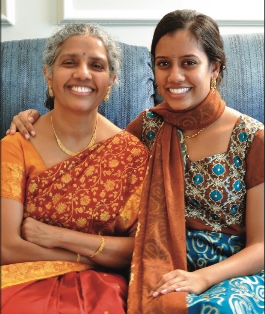BY APOORVA MURTHY
\If I had relied on the authority of every book I read, followed every custom I was told was important or blindly listened to every wise person I encountered, I can confidently say I would have been spiritually walking backwards. Not to mention I would have been left utterly confused.
Let me explain. I grew up in a very traditional, very religious, very Hindu household. And like (almost) any other teenager, pushing my mother’s buttons was a hobby–one I excelled at, might I add. I constantly questioned the things she asked me to do. Why should I pray out loud when I can do it just the same in my head? And what does this prayer mean anyway? Reincarnation? Do you have any proof? Why is it okay for Draupadi to have five husbands? That’s ridiculous. And don’t get me started on attaching an elephant head and resurrecting someone who was beheaded. What happened to the part where we’re not supposed to kill animals?
My mom probably recalls those days with frustration and can breathe a partial sigh of relief now, many years later, knowing that I didn’t stray too far from the path she wanted me to walk. I will admit that, initially, those questions were simply to render my mom speechless, leaving her without a retort so I could walk away victorious and never have to wake up early on Sunday to sit for prayers.
But she was never speechless, at least not permanently. She would always come back with an answer, and if she didn’t have an answer, she would direct me to where I could find one. She would suggest books, telling me I could read on my own if I didn’t believe her; she would tell me to talk to such-and-such Uncle or so-and-so Swamiji who knew much more than she did.
Looking back, my mom’s frustration was my growth. My questions were initially answerable. When I realized they were too easy for her, I began crafting better ones, questions with layers. When even those returned responses, I knew I had to change my strategy. I needed a base, a strong foundation upon which to build my questions.
I started reading more; I started going out of my way to find satisfactory answers. The more I read and the more I learned, the more questions I had. The more questions I had, the more my interest grew. I no longer questioned just for the sake of questioning, but to provide myself with a trajectory to learn more.
That’s how I came to finally appreciate what I was surrounded by growing up: the fact that I could question texts, ideas, people, and still never be termed a blasphemer. In fact, as I later learned, some of Hinduism’s first texts featured just that: questions and answers (and those “answers” were frequently counter-questions), conversation between individuals, explanation, interpretation, more questions, more dialogue.
As we progressed through grade school in America, our schooling shifted from teachers giving us answers to teachers teaching us how to ask questions. It was tedious at times, but now I see the value of the exercises we went through. We learned how to think analytically–how to synthesize facts and details to discover ideas and themes, and then, using this as a base, we could formulate questions for discussion, interpretation and analysis.
Learning how to critically and effectively question is an indispensable skill that I began developing early on. I challenged my parents with my questioning, but, more importantly, they challenged me back with their responses. I didn’t have the most-liked English teacher, but she forced us to change our approach to the material presented, to take ownership of the texts she assigned.
As a medical student, I can surely attest to the importance of memorizing information to establish a solid foundation. We have acronyms, shortcuts and now apps to help us. But being able to recall such information is only “step one” in the process of arriving at a diagnosis. We learn pattern recognition, but rarely do we encounter a “textbook case.” In fact–and we are told this daily–learning to ask the right questions is, by far, the most important skill we have to develop as future clinicians. Applying the knowledge we have, rather than simply recalling it.
Can (and should) this same principle, stressed throughout grade school, undergraduate, graduate and professional school be applied to our spiritual development as well?
Questioning one’s faith in order to grow spiritually may seem counter-intuitive, but for me it was crucial. Luckily, I grew up in an environment that encouraged debate and inquisition in all planes of learning. My mom was my first spiritual teacher. No, I didn’t follow her path, and I probably never will. But to her surprise, and to my own, I did create a path for myself. And I could walk wherever I wanted–my own path, never before traversed.
Apoorva Murthy, 23, is a medical student at the University of Texas Southwestern Medical Center in Dallas. She pursued a degree in Sanskrit and was involved in the Hindu Students Association branch at the University of Texas at Austin. She now focuses her spiritual pursuits on reading, blogging and volunteering at a local clinic.
